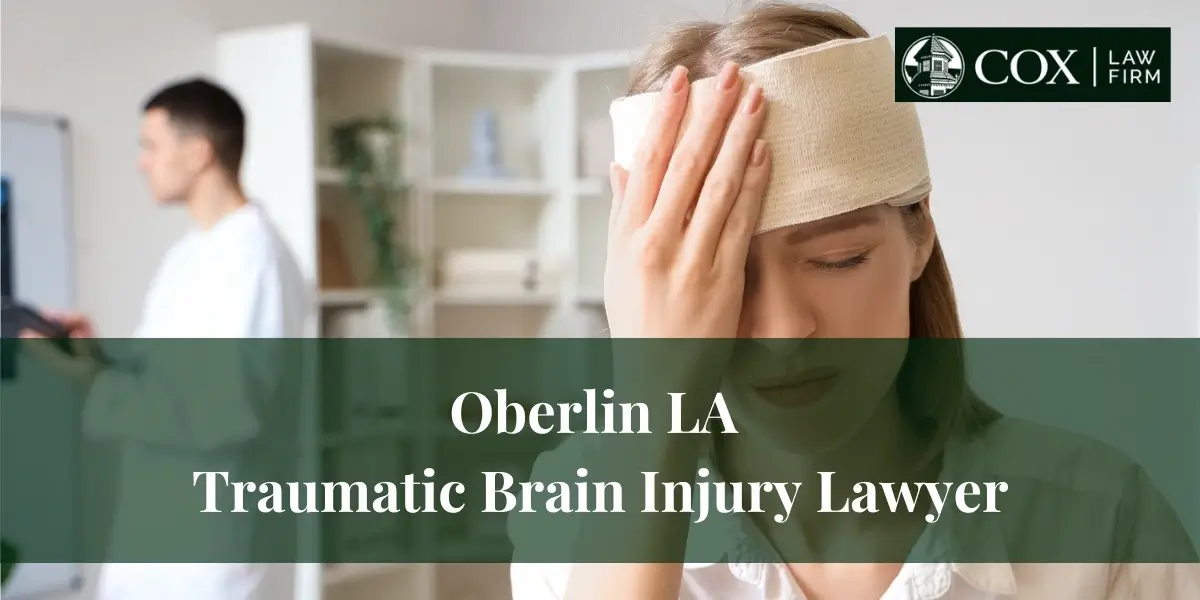Oberlin Traumatic Brain Injury Lawyer
Oberlin Traumatic Brain Injury Attorney
A brain injury should never be ignored. This is especially true when it results from someone else’s actions. In Oberlin, holding those parties responsible takes legal force. An Oberlin, LA traumatic brain injury lawyer can help build a strong case based on facts.

We Fight With Everything We’ve Got
Our clients come to us when they’re tired of hearing “no.” They bring hard cases. At Cox Law Firm, we turn things around. We pride ourselves on never losing sight of the human side of injury law. We see each case as a duty, not a transaction.
What Counts as a Traumatic Brain Injury?
A traumatic brain injury is not always obvious. Some injuries show up weeks after the event. Below are examples of what may qualify as a TBI under the law:
- Falls or impacts. These do not break the skill. However, there is still damage to the brain. They often happen in vehicle crashes or falls. Many victims experience memory loss.
- Penetrating injuries. These break through the skull. Sharp objects can harm brain tissue. Things like gunshot wounds fall under this category. Recovery may require surgery.
- Rapid shaking. Getting hit by a strong motion can lead to the head rapidly shaking. They often happen in car crashes. The damage may not show on a scan right away. Still, they can lead to long-term problems.
- Lack of oxygen. These can occur during a near-drowning. When the brain is deprived of oxygen, lasting harm may result. This can occur even if it only happens for a short time.
- Second-impact injuries. These happen when a second head injury occurs before the brain recovers from the first. This can make even a mild injury worse. Athletes are often at a higher risk.
From 2018 to 2019, unintentional falls accounted for 29.9% of all TBI-related deaths. This shows how drastic an accident can be.
Who May Be Liable for a Brain Injury?
Liability depends on how the injury happened. Say that a person slips on a wet grocery store floor. If they hit their head, the store may be liable for failing to fix a hazard. If a car crash leads to a brain injury, the driver who caused the crash may be responsible. In some cases, a company might also be liable. The law does not require proof of intent to cause harm. It looks at whether someone acted carelessly. If that carelessness caused the injury, then a claim may move forward.
In Louisiana, fault must be clearly proven. Courts will want to see how the other party’s actions led to the injury. Multiple parties may share legal responsibility. Many different people may all be named in one claim. For this reason, early investigation is helpful. The more time passes, the harder it is to track who did what. In many TBI cases, a clear legal path only becomes visible after gathering records.
The South had the highest age-adjusted TBI-related death rate of any US region. In 2019, the death rate was 18.9 per 100,000 people. States like Louisiana are part of that trend. This makes early legal action even more important.
What Families Should Do After a TBI
After a brain injury, the first step is always medical treatment. The sooner a person is seen by a doctor, the better the chances of recovery. Families should keep records of any changes in behavior.
Then, speak with a legal professional. With help, families can begin the process before valuable evidence disappears.
Why Do I Need an Attorney?
Brain injury cases often involve medical language and contested facts. A skilled legal team can step in to manage these challenges. That includes collecting records and speaking with insurance companies.
Lawyers can also guide injured people through each step of the process. That includes filing paperwork on time. They can build a case based on the facts. In more serious cases, they may take the claim to trial. Insurance companies often try to settle early. They may offer low amounts. With legal help, families can make sure they are not pressured into accepting less than what they need.
In 2018-2019, unintentional motor vehicle crashes represented about 17% of all fatal TBIs. That number shows that the stakes are high. It takes more than just medical care to recover. Legal support can help as well.
FAQs
What Qualifies as a Traumatic Brain Injury?
What qualifies as a traumatic brain injury is fairly broad. It happens when the brain suffers damage from an external force. This could include a blow to the head or any event that disrupts normal brain function. The injury can result in a wide range of cognitive effects. A person does not have to lose consciousness to have a qualifying injury.
Who Can Be Held Liable in a Traumatic Brain Injury Case?
Who can be held liable in a traumatic brain injury case depends on how the injury occurred. Drivers, employers, and others may all be held responsible. The law looks at whether there was someone involved who acted carelessly. In some cases, more than one party may share fault. An experienced legal team can determine the responsible parties.
How Long Do I Have to File a TBI Claim in Louisiana?
The time limit for filing a TBI claim in Louisiana is usually two years from the date of the injury. This short deadline is rigid. If a claim is filed too late, the court can dismiss it, no matter how strong the evidence is. There are some exceptions for minors. Still, waiting can cause problems.
What Evidence Is Needed to Support a TBI Claim?
In Oberlin, the evidence needed to support a TBI claim has to prove that someone else caused the injury. Medical documentation plays a central role. This can include assessments from an MRI or a neurologist. Other useful evidence includes incident reports. A legal team can help collect this information in a way that supports the claim.
We Take the Time to Listen
Living with a traumatic brain injury brings hardship to the people involved. They deserve compensation. A strong claim requires strong proof. Legal action can force results when nothing else will. Schedule a consultation with Cox Law Firm to get the support you need.
Request Your
Free Consultation
Fields Marked With An “ * ” Are Required

